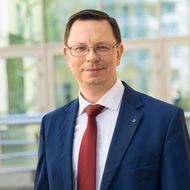The Pandemic Has Boosted Digitalization and Deglobalization: What Does It Mean for Russia?

The COVID-19 pandemic has caused global economic, social and technological transformations. Experts from HSE University and other education and research institutions from various countries discussed these transformations and other relevant trends for the future at the 3rd International Conference ‘East and West at the Stage of New Transformations: The Post-Covid Changes’.
The event took place at HSE University on November 17th and 18th in an online format. The conference was organized by the HSE Faculty of World Economy and International Affairs, the HSE School of International Regional Studies, and the HSE School of Asian Studies.
HSE Rector Nikita Anisimov opened the conference, noting that its participants included researchers from Russian and international universities and centres of expertise. ‘We are going to have exchanges of opinion and discussions, as is HSE University tradition,’ he said, adding that the conference is an open platform for developing strategic solutions.

Nikita Anisimov
Nikita Anisimov emphasized that the pandemic has brought up new issues in international relations, since countries have failed to fight COVID in a cohesive manner and ongoing tensions hamper the full utilization of the new digital reality. It is necessary to learn to hear each other and to speak the same technological and communicative language, he concluded.

Sergey Karaganov
The conference plenary session was on the topic of ‘Globalization and Deglobalization in the Post-Coronavirus World’. Deglobalization is taking place in all fields, said Sergey Karaganov, Academic Supervisor of the HSE Faculty of World Economy and International Affairs. ‘Soon, we are going to see not only deglobalization in economics, but regionalization and the re-nationalization of politics,’ he believes. World trade has already been falling for seven years, and the decline continues to accelerate: many value chains are being broken and will not be restored. The role of the state is growing—it is even greater today than 30 or 40 years ago. Mr. Karaganov believes that these things are good for Russia, allowing it to reduce its international dependency in many fields, including education.

Vitaly Naumkin
Vitaly Naumkin, Head of the HSE Joint Department with the RAS Institute of Oriental Studies, believes that to a certain extent, the pandemic is a form of globalization. One of the consequences of the pandemic is the breakthrough growth of digitalization. However, he agreed that deglobalization trends were already strong long before the pandemic
Other participants of the plenary session included Mehdi Sanaei, Associate Professor of the University of Tehran and Affiliated Researcher at the HSE School of International Regional Studies; Zhao Huasheng, Professor at the Institute for International Studies, Fudan University; and Robert Legvold, Professor Emeritus in the Department of Political Science at Columbia University.
The conference continued with two sections: ‘Country and Regional Responses to the Covid-19 Pandemic: Similarities and Differences’ and ‘Social Transformation and COVID-19: Economic, Political, and Social Dimensions’.
Sergey Luzyanin, Professor at the HSE School of International Regional Studies, said during the first section that the number of fatalities caused by the pandemic in just under two years has been huge: the official death toll stands at five million, which is similar to the population of such cities as Sydney, Hanoi, Ankara, Addis Ababa, Brasilia, St. Petersburg and Rome. And according to The Economist, the real number of victims of the pandemic might be three times higher. ‘But, as a “historical optimist” would say, this is still less than 0.2% of the global population, which is dozens of times lower than the losses from the Spanish flu or the Black Death,’ he added.

Sergey Luzyanin
The pandemic has created many risks for the world’s economy, politics and social sphere. At the same time, it has strengthened trends towards further automation and digitalization, Sergey Luzyanin explained. In 2019–2021, the average annual growth rate in the number of industrial robots and the population’s connectedness to the internet reached 10–12%, experts say. Alongside this, the share of global internet coverage reached almost 75% of the population, and the overall power of dozens of the world’s supercomputers has doubled over the last two years.

Igor Makarov
Igor Makarov, Head of the HSE School of World Economy, believes that the pandemic has caused the greatest decrease in GDP since WWII. ‘Is the pandemic the kind of event that can lead to fundamental shifts in global, and most of all, economic history?’ he asked. He believes that the pandemic is reinforcing trends that have been observed in the global economy in recent decades and ‘absolutizing’ them. Such trends include the fight against climate change, the growing role of the state, and the transformation of social policies.
The second day of the conference featured discussions and presentations as part of the section ‘Innovation amidst the COVID-19 Pandemic: National and Regional Aspects.’ A youth section on ‘Transformations of Global and Regional Integration Patterns: the COVID-19 Aftereffects’ drew interest from undergraduate, master’s and doctoral students from HSE University, MGIMO, MSU and Damascus University.
See also:
Academics Started Working Even More During the Pandemic
Academics’ work week became even longer during the pandemic. This is true of researchers from different countries, independently of their gender and specialisation, an international research team with HSE University participation found. Their working time during the pandemic was 51 hours compared to the usual 40. The increased number of working hours per week seems to have become part of the new academic norm. The results of the study were published in the Plos One journal.
‘We Have to Ask the Very Same People Multiple Times to Understand What Changes in Emotions, Attitudes, and Behaviors Really Take Place’
On November 6, Dr. Klaus Boehnke, Deputy Director of the HSE Centre for Sociocultural Research, presented his report entitled ‘Does COVID-19 propel value change: A comparison of Germany and the United Kingdom?’ at the ‘Culture Matters’ research seminar. HSE News Service has talked to Dr. Boehnke about various aspects of the value changes and socio-economic consequences of the pandemic in Europe and Russia.


